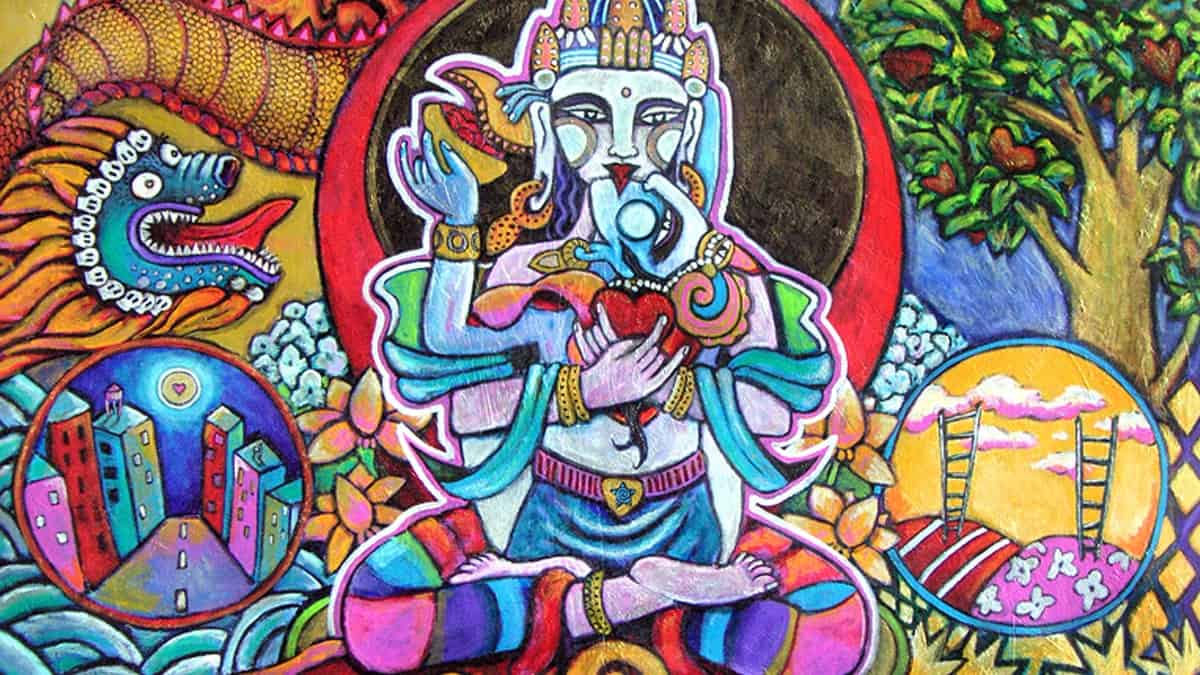David Deida explains how the three major schools of Buddhist thought reflect the stages of psycho-sexual maturity, and how these stages play themselves out in our spiritual practices and in our relationships.
Historically, the Buddhist tradition has developed through three major schools or “turnings” of thought and practice.
- The first school was the Hinayana tradition, with it’s emphasis upon escaping the cycle of suffering altogether, achieved in large part through disciplined renunciation of thought, emotion, pleasure, desire, etc.
- The second school of Buddhism, known as the Mahayana tradition, seeks to more fully engage the world of form. Rather than avoiding or simply observing negative thoughts and emotions, the Mahayana tradition places more emphasis upon using spiritual practice to transform negative into positive.
- The third school of Buddhist thought, the Vajrayana tradition, also strives to engage the world of form in a much more direct way—but rather than using the mind to transform things like fear, pain, hatred, and desire into their more positive counterparts, they are experienced and worked with exactly as they are, allowing “the poison to become the wisdom.” When we allow ourselves to experience the darkest corners of our souls openly and honestly, precisely as they are, they can become powerful sources of energy — leading us to the eternal stillness at the center of our hearts.
What does conflict look like from each of these stages, and how can we use this understanding in order to help us respond to the world from our highest possible selves, moment by moment? As an example, David describes three possible reactions to anger in a relationship: avoiding the conflict until emotions can settle (the “Hinayana response”), discussing and transmuting the anger for the sake of mutual growth (the “Mahayana response”), and meeting the anger head-on — erotically, perhaps — allowing it to be fully expressed without avoiding it or altering it in any way (the “Vajrayana response”).
While none of these responses can be said to be the “correct” response for all occasions, as any one could very possibly be the most appropriate for any given situation, these do indeed reflect three very different stages of psychological, spiritual, and sexual maturity. As such, each stage is essentially “more correct” than the last, requiring a considerable amount of practice and understanding to fully embrace and embody — for which we are all indebted to such exemplary teachers as David Deida, who are helping all those with the ears to listen to hear the ubiquitous sounds of God and Goddess in erotic communion, birthing the entire universe into existence, moment by precious moment.
Become a member today to listen to this premium podcast and support the global emergence of Integral consciousness
Membership benefits include:
Premium Content
Receive full access to weekly conversations hosted by leading thinkers

Journal Library
Receive full access to the growing Journal of Integral Theory & Practice library

Live Experiences
Stay connected by participating in Integral Life live events and discussions
Courses & Products
Get unlimited 20% discount off all products and courses from our friends and partners

Free Bonus Gifts
Download The Integral Vision eBook by Ken Wilber (worth $19 on Amazon) & The Ken Wilber Biography Series

Support of the movement
Support our mission of educating and spreading integral consciousness that is more critical than at any time in its history
About David Deida
Acknowledged as one of the world's most insightful and provocative spiritual teachers of our time, best-selling author David Deida continues to revolutionize the way that men and women grow spiritually and sexually. His teachings and writings on a radically practical spirituality for our time have been hailed as among the most original and authentic contributions to personal and spiritual growth currently available.

